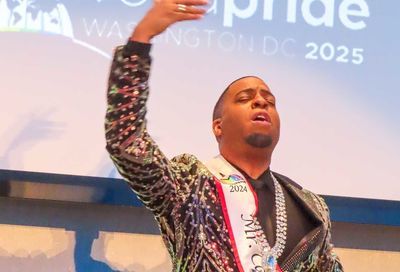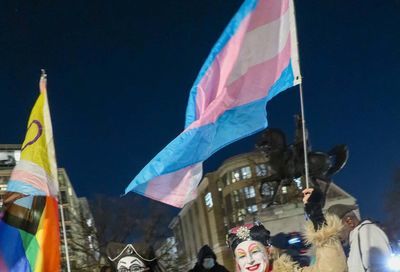Trump nominates Neil Gorsuch for Supreme Court
Conservative judge's "originalist" approach could be problematic for LGBT people

President Donald Trump on Tuesday evening nominated Neil Gorsuch, a judge sitting on the 10th U.S. Circuit Court of Appeals, to fill Justice Antonin Scalia’s seat on the Supreme Court.
In Gorsuch, Trump is selecting someone in the mold of Scalia. Gorsuch, who was nominated to his current position by President George W. Bush in 2006, has been known as an “originalist,” meaning he seeks to interpret the law in a limited way, as originally intended by the framers of the Constitution. For instance, an originalist would say that only Congress is vested with the power to pass legislation, and that laws must be interpreted precisely as written by Congress, and not subject to extraneous interpretation by courts or federal agencies tasked with enforcing the law.
Where Gorsuch differs from Justice Scalia largely lies in his interpretation of the role of federal agencies. Unlike Scalia, Gorsuch does not support what is known as the Chevron doctrine, which could be important for the LGBT community.
Under the Chevron doctrine, courts are expected to defer to an agency’s own interpretations of the authority granted to them by Congress in cases where 1) the intent of Congress was ambiguous; and 2) the interpretation adopted by the agency can be considered reasonable or permissible.
Gorsuch has differed, embracing the idea that courts should be able to overrule agency experts when it comes to enforcing regulations, as he did in Gutierrez-Brizuela v. Lynch and Caring Hearts Personal Home Services, Inc. v. Burwell.
For the LGBT community, dismissal of the Chevron doctrine could be problematic, as agency rules friendly to LGBT interests could be reversed by Congress.
In one example, the Office of Civil Rights at the U.S. Department of Education has interpreted Title IX, a law preventing sex discrimination, as extending to cover transgender students. This was the interpretation that the 4th U.S. Circuit Court of Appeals deferred to earlier this year when it ruled in favor of transgender student Gavin Grimm in his lawsuit against the Gloucester County School Board.
Changing the interpretation of “sex” to mean only biological sex, and not sex-based stereotypes or gender nonconformity, would mean more school systems would be able to ban transgender students from accessing restrooms, locker rooms, or other sex-specific facilities, as Gloucester County did in the Grimm case.
Gorsuch also joined a 2015 opinion in the case of Druley v. Patton, in which a transgender woman who was incarcerated claimed that the Oklahoma Department of Corrections had violated her constitutional rights by denying her access to medically necessary hormone treatment and her request to wear feminine clothing as part of her treatment for gender dysphoria.
Gorsuch was also one of the original judges in the Burwell v. Hobby Lobby decision, which found that corporations are considered people, and can refuse to cover contraceptives as part of their employees’ health insurance, based on their personal religious objections.
As Metro Weekly previously reported, the implications of the decision extend far beyond birth control and could endanger some LGBT protections. For instance, if the head of a corporation held personal or religious objections to same-sex marriage, homosexuality, or extramarital sex, they might decide to refuse to extend benefits to the spouses or children of LGBT employees, or might refuse to cover medications like PrEP or antiretrovirals.
Additionally, in 2005, Gorscuh wrote an essay, “Liberals’N’Lawsuits,” in which he expressed objections to civil rights impact litigation.
“American liberals have become addicted to the courtroom, relying on judges and lawyers rather than elected leaders and the ballot box, as the primary means of effecting their social agenda on everything from gay marriage to assisted suicide to the use of vouchers for private-school education,” Gorsuch wrote. “This overweening addiction to the courtroom as the place to debate social policy is bad for the country and bad for the judiciary.”
Gorsuch was born on Aug. 29, 1967 in Denver, Colo. and moved to Washington, D.C. in 1981. His mother, Anne Gorsuch, was the Administrator of the Environmental Protection Agency under President Reagan. A graduate of Harvard Law School, he previously clerked for two Supreme Court Justices: Byron White and Anthony Kennedy.
Trump’s selection of Gorsuch is guaranteed to kick off an emotionally-charged and contentious fight in Congress, as Senate Democrats are expected to block his nomination.
Many on the Left have urged Democrats to filibuster the nominee and leave the court with only eight justices, feeling that Republicans unfairly denied President Obama’s nominee, Judge Merrick Garland, the right to a confirmation hearing.
In a statement released during President Trump’s prime time announcement, People For the American Way President Michael Keegan called Gorsuch’s nomination “unacceptable.”
“Judge Neil Gorsuch is an ideological warrior who puts his own right-wing politics above the Constitution, the law and the rights of everyday people,” Keegan said, adding: “Judge Gorsuch has spent his entire career pushing an extreme agenda that hurts ordinary Americans. He has made clear that he’s a patently unacceptable choice who’d push his own dangerous agenda from the bench.
“Over the course of his career, he’s turned his back on fundamental American rights, from shutting down claims of gender discrimination in the workplace, to trying to limit Americans’ ability to join class-action lawsuits to challenge corporate wrong-doing, to ruling in the original Hobby Lobby decision that corporations are people and can refuse to offer their employees birth control, to claiming that a police officer could not be sued for using excessive force when his stun gun killed a young man running from police simply because he was growing marijuana plants. That’s appalling.”
This is a developing story.
Support Metro Weekly’s Journalism
These are challenging times for news organizations. And yet it’s crucial we stay active and provide vital resources and information to both our local readers and the world. So won’t you please take a moment and consider supporting Metro Weekly with a membership? For as little as $5 a month, you can help ensure Metro Weekly magazine and MetroWeekly.com remain free, viable resources as we provide the best, most diverse, culturally-resonant LGBTQ coverage in both the D.C. region and around the world. Memberships come with exclusive perks and discounts, your own personal digital delivery of each week’s magazine (and an archive), access to our Member's Lounge when it launches this fall, and exclusive members-only items like Metro Weekly Membership Mugs and Tote Bags! Check out all our membership levels here and please join us today!























You must be logged in to post a comment.